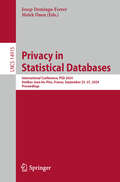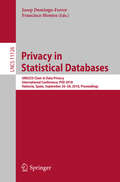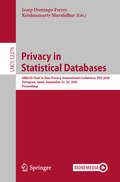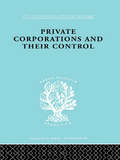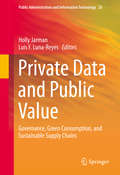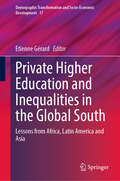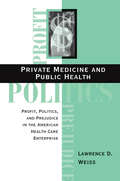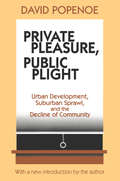- Table View
- List View
Privacy in Statistical Databases: International Conference, PSD 2024, Antibes Juan-les-Pins, France, September 25–27, 2024, Proceedings (Lecture Notes in Computer Science #14915)
by Josep Domingo-Ferrer Melek ÖnenThis book constitutes the refereed proceedings of the International Conference on Privacy in Statistical Databases, PSD 2024, held in Antibes Juan-les-Pins, France, during September 25-27, 2024. The 28 papers presented in this volume were carefully reviewed and selected from 46 submissions. They were organized in topical sections as follows: Privacy models and concepts; Microdata protection; Statistical table protection; Synthetic data generation methods; Synthetic data generation software; Disclosure risk assessment; Spatial and georeferenced data; Machine learning and privacy; and Case studies.
Privacy in Statistical Databases: UNESCO Chair in Data Privacy, International Conference, PSD 2018, Valencia, Spain, September 26–28, 2018, Proceedings (Lecture Notes in Computer Science #11126)
by Josep Domingo-Ferrer Francisco MontesThis book constitutes the refereed proceedings of the International Conference on Privacy in Statistical Databases, PSD 2018, held in Valencia, Spain, in September 2018 under the sponsorship of the UNESCO Chair in Data Privacy. The 23 revised full papers presented were carefully reviewed and selected from 42 submissions. The papers are organized into the following topics: tabular data protection; synthetic data; microdata and big data masking; record linkage; and spatial and mobility data.Chapter "SwapMob: Swapping Trajectories for Mobility Anonymization" is available open access under a Creative Commons Attribution 4.0 International License via link.springer.com.
Privacy in Statistical Databases: UNESCO Chair in Data Privacy, International Conference, PSD 2020, Tarragona, Spain, September 23–25, 2020, Proceedings (Lecture Notes in Computer Science #12276)
by Josep Domingo-Ferrer Krishnamurty MuralidharThis book constitutes the refereed proceedings of the International Conference on Privacy in Statistical Databases, PSD 2020, held in Tarragona, Spain, in September 2020 under the sponsorship of the UNESCO Chair in Data Privacy.The 25 revised full papers presented were carefully reviewed and selected from 49 submissions. The papers are organized into the following topics: privacy models; microdata protection; protection of statistical tables; protection of interactive and mobility databases; record linkage and alternative methods; synthetic data; data quality; and case studies.The Chapter “Explaining recurrent machine learning models: integral privacy revisited” is available open access under a Creative Commons Attribution 4.0 International License via link.springer.com.
Privacy in a Cyber Age
by Amitai EtzioniThis book lays out the foundation of a privacy doctrine suitable to the cyber age. It limits the volume, sensitivity, and secondary analysis that can be carried out. In studying these matters, the book examines the privacy issues raised by the NSA, publication of state secrets, and DNA usage.
Privacy, Due Process and the Computational Turn: The Philosophy of Law Meets the Philosophy of Technology
by Mireille Hildebrandt Katja De VriesPrivacy, Due process and the Computational Turn: The Philosophy of Law Meets the Philosophy of Technology engages with the rapidly developing computational aspects of our world including data mining, behavioural advertising, iGovernment, profiling for intelligence, customer relationship management, smart search engines, personalized news feeds, and so on in order to consider their implications for the assumptions on which our legal framework has been built. The contributions to this volume focus on the issue of privacy, which is often equated with data privacy and data security, location privacy, anonymity, pseudonymity, unobservability, and unlinkability. Here, however, the extent to which predictive and other types of data analytics operate in ways that may or may not violate privacy is rigorously taken up, both technologically and legally, in order to open up new possibilities for considering, and contesting, how we are increasingly being correlated and categorizedin relationship with due process – the right to contest how the profiling systems are categorizing and deciding about us.
Privacy: Algorithms and Society (Algorithms and Society)
by Michael FilimowiczPrivacy: Algorithms and Society focuses on encryption technologies and privacy debates in journalistic crypto-cultures, countersurveillance technologies, digital advertising, and cellular location data. Important questions are raised such as: How much information will we be allowed to keep private through the use of encryption on our computational devices? What rights do we have to secure and personalized channels of communication, and how should those be balanced by the state’s interests in maintaining order and degrading the capacity of criminals and rival state actors to organize through data channels? What new regimes may be required for states to conduct digital searches, and how does encryption act as countersurveillance? How have key debates relied on racialized social constructions in their discourse? What transformations in journalistic media and practices have occurred with the development of encryption tools? How are the digital footprints of consumers tracked and targeted? Scholars and students from many backgrounds as well as policy makers, journalists, and the general reading public will find a multidisciplinary approach to questions of privacy and encryption encompassing research from Communication, Sociology, Critical Data Studies, and Advertising and Public Relations.
Privacy: Studies in Social and Cultural History (Routledge Revivals)
by Barrington Moore, JrThis title was first published in 1984. Focusing on Brazil, this text covers issues such as: the legacy of colour; social realities; and diversions and assertive behaviour.
Privat – öffentlich – politisch: Gesellschaftstheorien in feministischer Perspektive (Gesellschaftstheorien und Gender)
by Heike Kahlert Günter Burkart Nina Degele Diana CicheckiDieser Band bringt ausgewählte Theorien – Gesellschaftstheorien und einflussreiche soziologische Zeitdiagnosen – in einen Dialog mit der feministischen Debatte zum Spannungsverhältnis von privat und öffentlich.Die Begrifflichkeiten öffentlich und privat sind ein eng mit den Geschlechterverhältnissen assoziiertes Ordnungsprinzip gesellschaftlicher Entwicklung und damit hochpolitisch. Der Fokus dieses Bandes liegt auf der Frage, welche Bedeutung dieser Unterscheidung heute noch zukommt – in einer Zeit, in der viel von Grenzauflösungen die Rede ist und damit oft auch eine Auflösung der beiden Sphären gemeint ist. Es ist ein erster Schritt in Richtung eines zeitdiagnostischen Entwurfs, in dem die Unterscheidung zwischen öffentlich und privat, deren Zusammenhang mit Geschlecht und Gesellschaft und deren politische Brisanz im Zentrum des Interesses stehen. Die Auseinandersetzungen mit etablierten Theorien (u.a. von Arendt, Bourdieu, Foucault, Habermas sowie Kritische Theorie, Postcolonial Theory, Queer Theory) sind ausgerichtet am möglichen Ertrag für eine GeschlechterGesellschaftsTheorie, das heißt, für eine Gesellschaftstheorie, die Geschlechterverhältnisse nicht als empirische Variable, sondern als grundlegende Strukturkategorie behandelt, und die auf Veränderungen, die sich mit dem Bedeutungswandel von privat, öffentlich und politisch einstellen, angemessen reagieren kann.
Privat: Zwischen Überwachung und Profit
by Florian CoulmasSteht „privat“ für einen Wert der Vergangenheit? Dieses Buch beleuchtet Privatheit aus politischer, rechtlicher, philosophischer und kulturgeschichtlicher Sicht. Die verschiedenen Perspektiven – ein historischer Rückblick auf die Entstehung und Entwicklung des Begriffs in Europa, Vergleiche mit Entsprechungen anderer Kulturen, eine kritische Darstellung der gesellschaftlichen Bedeutung von Privatheit heute und eine Diskussion ihrer politischen und rechtlichen Dimensionen – sollen zum Verständnis beitragen, warum Privatheit Anlass zu Kontroversen gibt und um welche bzw. wessen Interessen es dabei geht.
Private Affairs: Critical Ventures in the Culture of Social Relations (Sexual Cultures #22)
by Phillip Brian HarperIn Private Affairs, Phillip Brian Harper explores the social and cultural significance of the private, proposing that, far from a universal right, privacy is limited by one's racial-and sexual-minority status. Ranging across cinema, literature, sculpture, and lived encounters-from Rodin's The Kiss to Jenny Livingston's Paris is Burning-Private Affairs demonstrates how the very concept of privacy creates personal and sociopolitical hierarchies in contemporary America.
Private Bodies, Public Texts: Race, Gender, and a Cultural Bioethics
by Karla Fc HollowayIn Private Bodies, Public Texts, Karla FC Holloway examines instances where medical issues and information that would usually be seen as intimate, private matters are forced into the public sphere. As she demonstrates, the resulting social dramas often play out on the bodies of women and African Americans. Holloway discusses the spectacle of the Terri Schiavo right-to-die case and the injustice of medical researchers' use of Henrietta Lacks's cell line without her or her family's knowledge or permission. She offers a provocative reading of the Tuskegee syphilis study and a haunting account of the ethical dilemmas that confronted physicians, patients, and families when a hospital became a space for dying rather than healing during Hurricane Katrina; even at that dire moment, race mattered. Private Bodies, Public Texts is a compelling call for a cultural bioethics that attends to the historical and social factors that render some populations more vulnerable than others in medical and legal contexts. Holloway proposes literature as a conceptual anchor for discussions of race, gender, bioethics, and the right to privacy. Literary narratives can accommodate thick description, multiple subjectivities, contradiction, and complexity.
Private Cities: Global and Local Perspectives (Routledge Studies in Human Geography #Vol. 13)
by Chris Webster Georg Glasze Klaus FrantzFor the antagonist, private communities are icons of post-consensus, fragmenting civic society, enclosing and excluding by contractual constitution and sometimes by walls and gates. For others they are simply an efficient new way of organizing urban life. Contributed to, and edited by, an international team of leading authors, this revealing book constructs an interdisciplinary discourse on the global spread of private communities based upon empirical evidence. Case studies from the US, Latin America, the Middle East, Europe and China are used to explore local and global explanations of the phenomenon. Taking an institutionalist approach, this informative textbook for undergraduates, postgraduates, and researchers alike, develops a model in which cities are shaped by the interplay of local and global processes, and evolve at the interface of spontaneous and planned order. It draws together the various themes, propositions and hypotheses in a way that clarifies the questions by different social science perspectives and that poses researchable questions and new agendas.
Private Corporations and their Control: Part 1 (International Library of Sociology #Vol. 160)
by A.B. LevyFirst published in 1998. Routledge is an imprint of Taylor & Francis, an informa company.
Private Corporations and their Control: Part 2 (International Library of Sociology #Vol. 160)
by A.B. LevyFirst published in 1998. Routledge is an imprint of Taylor & Francis, an informa company.
Private Data and Public Value
by Holly Jarman Luis F. Luna-ReyesThis book investigates the ways inwhich these systems can promote public value by encouraging the disclosure andreuse of privately-held data in ways that support collective values such asenvironmental sustainability. Supported by funding from the National ScienceFoundation, the authors' research team has been working on one such system,designed to enhance consumers ability to access information about thesustainability of the products that they buy and the supply chains that producethem. Pulled by rapidly developing technology and pushed by budget cuts,politicians and public managers are attempting to find ways to increase thepublic value of their actions. Policymakers are increasingly acknowledging thepotential that lies in publicly disclosing more of the data that they hold, aswell as incentivizing individuals and organizations to access, use, and combineit in new ways. Due to technological advances which include smarterphones, better ways to track objects and people as they travel, and moreefficient data processing, it is now possible to build systems which useshared, transparent data in creative ways. The book adds to thecurrent conversation among academics and practitioners about how to promotepublic value through data disclosure, focusing particularly on the roles thatgovernments, businesses and non-profit actors can play in this process, makingit of interest to both scholars and policy-makers.
Private Higher Education and Inequalities in the Global South: Lessons from Africa, Latin America and Asia (Demographic Transformation and Socio-Economic Development #17)
by Etienne GérardBased on original findings from research carried out in six low- and middle-income countries in Africa, Asia and Latin America, this book brings together conceptual and empirical analyses of private higher education and social and academic inequality, a topic largely unexplored in the social science literature, particularly on private higher education. Field surveys of different categories of actors in numerous private universities have combined common methods and tools in countries chosen for the differences in their social structures and the characteristics, organization and development of their private higher education systems. Based on these qualitative surveys, combined with available quantitative data on higher education, this book analyzes the production and reproduction of social and academic inequalities in countries as diverse as Argentina, Malaysia, Mexico, Peru, the Democratic Republic of Congo, Senegal and Vietnam. Finally, the historical and social structuringof the private education systems in the selected countries provides the framework for analyses that go beyond the traditional higher education demand/supply and public policy approaches to explore the perspective of the actors – institutional administrators, teaching staff and students.
Private Life Under Socialism: Love, Intimacy, and Family Change in a Chinese Village, 1949-1999
by Yunxiang YanFor seven years in the 1970s, the author lived in a village in northeast China as an ordinary farmer. In 1989, he returned to the village as an anthropologist to begin the unparalleled span of eleven years’ fieldwork that has resulted in this book―a comprehensive, vivid, and nuanced account of family change and the transformation of private life in rural China from 1949 to 1999. <p><p> The author’s focus on the personal and the emotional sets this book apart from most studies of the Chinese family. Yan explores private lives to examine areas of family life that have been largely overlooked, such as emotion, desire, intimacy, privacy, conjugality, and individuality. <p><p> He concludes that the past five decades have witnessed a dual transformation of private life: the rise of the private family, within which the private lives of individual women and men are thriving.
Private Management and Public Policy: The Principle of Public Responsibility
by James E. Post Lee E. PrestonPrivate Management and Public Policy is a landmark work at the intersection of business and society. First published in 1975, it focuses on the management processes that companies use to respond to social issues. The text develops the "principle of public responsibility" as an alternative to the notion that firms have unlimited accountability. And, it presents one of the first systems-based approaches to corporate responsibility, providing theoretical support for business involvement in public policy. Arguably, the book's major contribution is its broad outline of an alternative theory of the firm in society—one that offers the possibility of overcoming traditional public and private dichotomies.
Private Medicine And Public Health: Profit, Politics, And Prejudice In The American Health Care Enterprise
by Lawrence D WeissThis book surveys the broad expanse of health and health care institutions in America from a critical, macro, political-economic, and social problems-oriented perspective. It presents a political-economic analysis that is a deeper analysis of the political influences exercised by industry.
Private Pleasure, Public Plight: Urban Development, Suburban Sprawl, and the Decline of Community
by Hans KummerThis is a social and cultural analysis of community life in metropolitan areas of three nations--the United States, Sweden, and England. The author focuses on how environment and culture interact to shape human behavior. Despite their many similarities, the three societies offer remarkably contrasting urban forms, and thus provide a unique opportunity for comparative research. The findings suggest goals for urban community development in America that can help regain a sense of human scale and establish more meaningful face-to-face contact among urban dwellers.David Popenoe is professor of sociology at Rutgers University. He has had visiting appointments in the Centre for Environment Studies (London), the University of Stockholm, New York University, and the University of Pennsylvania. Among his other books are: Distributing the Nest: Family Change and Decline in Modern Societies; The Suburban Environment: Sweden and the United States; Neighborhood, City and Metropolis; The Urban Industrial Frontier and a basic text on sociology that will soon appear in its seventh edition.
Private Practices: Girls Reading Fiction And Constructing Identity
by Meredith Cherland University of Regina, Saskatchewan, Canada.First Published in 1994. Routledge is an imprint of Taylor & Francis, an informa company.
Private Profits versus Public Policy: The Pharmaceutical Industry and the Canadian State
by Joel LexchinThe widespread condemnation of drastic price increases on life-saving drugs highlights our growing dependency on and vulnerability to international pharmaceutical conglomerates. However, aren't the interests of the public supposed to supersede the pursuit of private profit?In his new work, Private Profits versus Public Policy, Joel Lexchin addresses this question as he examines how public policy with respect to the pharmaceutical industry has evolved in Canada over the past half century. Although the Canadian government is supposed to regulate the industry to serve the needs of public health, waves of deregulatory reforms and intellectual property rights legislation have shifted the balance of power in favour of these companies' quest for profit. Joel Lexchin offers a series of recommendations to tip the scale back in the public's favour. This enlightening work is the first book that deals exclusively with the pharmaceutical industry in Canada in over thirty years.
Private Property, Freedom, and Order: Social Contract Theories from Hobbes To Rawls
by Mehmet KanatliThis book looks at how the ideas of freedom, property, and order are expressed in modern social contract theories (SCTs). Drawing on the theories of Hobbes, Locke, Rousseau, and Rawls, it studies how notions of freedom promulgated by these SCTs invariably legitimise and defend the private ownership of the means of production. It argues that capitalism’s impact on individual dependence and economic inequality still stems from this model, ultimately working in favour of proprietors. The author highlights the problematic nature of SCTs, which work as ideological mechanisms put forward under the guise of formal equality and formal freedom, by focusing on the historical and social context behind them. From a methodological point of view, the author presents a de-ideologization of the contractarian issue and provides insight into the political ‘layers’ within the discourse of individualism, human nature and morality shaping the outer corners of contractarian theory. An important intervention in the study of SCTs, this volume will be of great interest to scholars and researchers of political and social theory, sociology, political history, and political philosophy.
Private Rented Housing in the United States and Europe
by Michael HarloeOriginally published in 1974, this book surveys the experience of public and quasi public housing in the UK, USA, France, Germany, the former USSR, Israel, Denmark, Sweden, Hungary and Puerto Rico. Each country’s housing policy is set in a broad social and historical context, showing how the policy developed and how effective it was. Administrative problems encountered in different countries are evaluated and compared and many similarities emerge. The relationship of housing to transport, education and employment is discussed and special attention is focused on the role of new towns in Sweden, the former USSR, the UK, Israel and the USA.
Private Risks and Public Dangers (Routledge Library Editions: British Sociological Association #21)
by Gareth Williams Stephen Platt Sue Scott Hilary ThomasPrivate Risk and Public Dangers is comprised of a collection of chapters which were originally papers presented in the 1991 British Sociological Association Conference on Health and Society, and they address a range of private risks and public dangers. Issues covered vary from the response to HIV and AIDS and ‘foetal alcohol syndrome’ to the nature of accidents. These seemingly diverse social situations within which emerges is that we need a more sociologically informed understanding of the personal shading the public dangers they are expected to manage.
